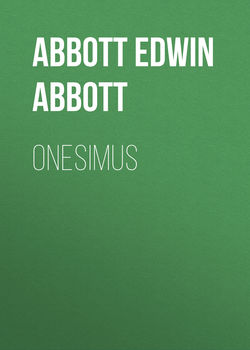Читать книгу Onesimus - Abbott Edwin Abbott - Страница 10
THE SECOND BOOK
§ 2. HOW SOME OF PHILEMON’S FRIENDS AVOWED A BELIEF IN ONE GOD
ОглавлениеI soon found that, although the philosophers whom I have mentioned above, believed in gods, yet their belief differed much from that of the common people; for the latter believe in many gods, but the former inclined to acknowledge one god under many names. It was at a symposium, during a public festival in honor of Artemis, that I first heard this opinion broached by Nicostratus who said that “there was in reality but one Power, however He may manifest Himself to mortals by many different shapes and names in several lands and nations, speaking also through different prophets, a Delphic woman in Pytho, a Thesprotian man in Dodona, a Libyan in the Temple of Ammon, an Ionian in Claros, a Lycian in Xanthias, and a Bœotian in Ismenus.” I looked that he should have been reproved and put to silence by my master; but Philemon said nothing except that this doctrine was not fit to be taught in that shape to the common people; and the rest seemed to assent to Nicostratus. Heracleas, in particular, said that “though the number of gods and demons, or demoniacal essences, be far more than the 30,000 whereof Hesiod makes mention, yet the mighty King of all this multitude, seated on his stable throne as if He were Law, imparts unto the obedient that health and safety which He contains in Himself.” To me also, in our private and familiar discourse, the young Epictetus would always speak, not of many, but of One, who guides all things and to whose will we must conform ourselves. As for idols and statues of the gods—of which I had always been wont at Lystra to speak as being themselves gods, so that I could scarce think of the gods apart from them—Nicostratus said openly at this same feast, that it was no marvel if the immortal powers preferred to inhabit beautiful shapes of gold and stone and ivory; which nevertheless were of course to be distinguished from the gods themselves, as being but the integuments of the divine senses; but Heracleas went yet further (and Epictetus with him) saying that one should no more accost an image than a house (instead of the householder); and that images were not needful but only helpful for the forgetful souls of men.
When Heracleas avowed his belief in the myths and metamorphoses and fables about the gods I said to him, “Why, O Heracleas, are there no metamorphoses in our days?” “Because,” replied he, “men have degenerated from their progenitors of ancient date. Therefore it is no marvel that the gods refuse to perform such wonders as of old for mankind upon earth. But in the former days the pious were naturally changed from men into gods, and these are even now honored, such as Aristaeus, Heracles, Amphiaraus, Asclepius, and the like. Having regard to these facts, any one may reasonably be persuaded that Lycaon was changed into a wolf, Procne into a swallow, and Niobe into a stone. At present, however, now that vice has spread itself through every part of the earth, the divine nature is no longer produced out of the human, or, in other words, men are no longer made gods but only dignified with the title thereof through excess of flattery, as some among us call the emperors gods even while they yet live.” To this Nicostratus assented, but added that “the lies of the multitude are sometimes to blame, pouring contempt upon undoubted facts in the attempt to adorn and exaggerate them, as for example, asserting not only that Niobe was changed into a stone, which is true, but also that Niobe on Sipylus still weeps, which is not true.” More passed between them; but this I discerned clearly that both they and many others, while acknowledging one god under many names, agreed with Philemon (and not with Artemidorus the Epicurean) in believing without doubt the myths and fables about the gods.
